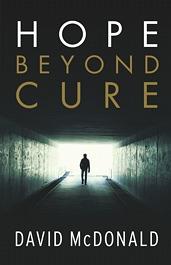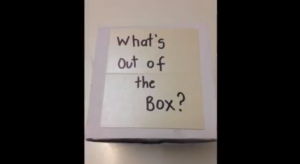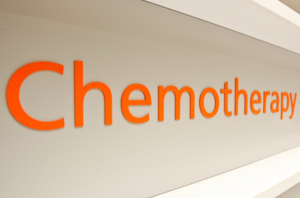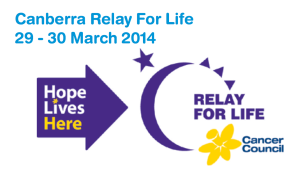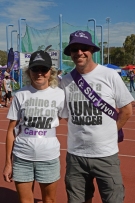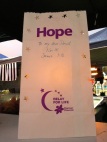This an edited version of a letter my wife, Fiona, sent to support an application to the Therapeutic Goods Association (TGA) to ask them to please put Crizotnib (Xalkori) on the Pharmaceutical Benefits Scheme (PBS). This drug has proven results and yet is virtually unaffordable to all, at $7400 per month.
I understand you are collecting letters of support for Crizotinib being accepted on PBS. I’m not sure if TGA read submissions from individuals, but here goes…
This is not a scientific submission, but more a letter from one family suffering through a family member having ALK+ lung cancer. Whilst the TGA doesn’t court letters of submission from patients, this is an attempt to explain how TGA decisions affect individual families.
My perfectly well husband presented with a pleural effusion in Dec 11, being diagnosed with ALK+ lung cancer. He missed getting on the Crizotinib trial, because by the time we got the result, he had already received his first cycle of carboplatinum, alimta, and avastin, thus making him ineligible for the trial.
I chose this combination over what was being offered by the PBS (and our oncologist) at the time—Carbo/Docetaxel—because international research seemed to suggest it was more effective and had less severe side effects for general lung cancers.
My understanding when I spoke to the TGA a couple of years ago, was that the testing for ALK had to be passed by MSAC, with Crizotinib going before PBAC at the same time, before the TGA could consider putting Crizotinib on the PBS. My understanding is that both MSAC and PBAC have again deferred decisions as of Nov 2013. At that point they were struggling to understand who to allow ALK testing for.
As a carer for her non-smoking 48 year old Aussie husband it was pretty obvious to me, especially when he came back EGFR negative, that we should ask for and pay for the ALK test.
Looking through the ‘ALK+ roll call’ discussions onhttp://www.inspire.com it’s still obvious to me who should get tested for ALK. They are all younger non-smokers, who present late with stage 4 metastatic symptoms, because the original is on the periphery, not in the bronchi like standard smoking cancers. There are also histological features which are more suggestive of ALK—signet ring or acinar histology.
Our pathologist noted these on David’s histology, alerting the thoracic surgeon that this was unusual for standard lung cancer, and that maybe there was something else going on.
Surely it’s not too hard to offer ALK testing as a priority to patients in this category.
I’ve also heard that there’s new testing becoming available, which will be much cheaper, quicker, and give more of an idea as to whom to send for the more expensive testing. Hopefully, this will be commonplace soon.
In 2014, about 11550 Australians are expected to be diagnosed with lung cancer. Approximately 15-20%, or roughly 2000 people, will be non-smokers with a genetic mutation. Of these approximately 3-4 %, or 345 people, will be ALK+ in this year alone.
The Inspire roll call only found about 10, but obviously not everyone reads or visits http://www.inspire.com, and nor is everyone connected via a clinical trial.
We do not know of any other ALK+ patients in Canberra, but then oncologists don’t share patient information. There hasn’t been anyone else with this mutation coming to the lung cancer support group at Canberra Hospital.
But then again, how many are being tested, or not tested because of financial reasons?
I’ve just referred a younger, unusual, possible lung cancer patient to Canberra Hospital in this last week, and I’ll be willing to find money for him through my workplace or the Eden-Monaro Cancer Support Group, if need be, because he couldn’t necessarily afford the money for testing.
As stated earlier, my understanding was that PBS approval for Crizotnib was again deferred in Nov 2013. This seemed more due to semantics than actual proof that Crizotinib did or didn’t work, or the cost-benefits of approval.
Even for intelligent people in the medical profession, it is difficult to read and understand the documents deferring approval. To read that PFS has shown ‘statistical improvement’ is hugely exciting. But to read ‘that OS hasn’t been demonstrated’—how does one prove that, except by time and death?
As a carer it’s also hard to read the statistics of overall survival and progression free survival without taking it personally. These statistics are talking about the future of my husband. He can’t read them without being overwhelmed, even though he’s been outside the statistics thus far.
It shouldn’t be up to the patients and carers to have to trawl through these statistics to prove to the government that life is worth living, that some good quality of life is better than life cut short for lack of funding for medication that works, even if just for a limited time.
My husband has responded miraculously to an Alimta/Avastin combo for over 40 cycles, being NED for nearly a year and a half now. These treatments have cost us very large sums of money. Avastin isn’t on the standard guidelines treatment plan and the study on the benefits of adding Avastin to Alimta has not yet been released. Given that this combination has worked for my husband, he continues to endure the physical impact and financial costs until there is definitive proof that it doesn’t help.
But, we still need Crizotinib to be placed on the PBS list. Please consider the following…
1. The demand of 3 weekly cycles is hard. It’s hard for my husband to psyche himself to go to the hospital every 3 weeks to pump poison into his veins, knowing that its going to make him sick for the next week, often spending 3 or 4 days in bed. Not that the following 2 weeks till the next cycle are easy, with fatigue, headache, GIT upset, mouth/tongue ulceration, pain, acne, skin rash, itch, and more.
From early on he’s had to add in Cymbalta for peripheral neuropathy, increasing amounts of antihypertensive, pain relief, antinauseants, dexamethasone, folic acid, Vitamin B12 injections, etc.
Do they consider the cost effectiveness of paying for medications to deal with the side effects of ‘standard chemo treatment’? There is also the cost of the private chemo ward every 3 weeks.
Because Alimta or Avastin weren’t on PBS when he started, all treatment had to be done through a private hospital.
How much simpler it would be—physically, mentally, emotionally, financially—if my husband had been able to simply take a Crizotnib tablet twice a day.
2. Unfortunately chemo brain is a real phenomenon too (as is carer’s brain). His memory isn’t as good as it was, and nor is mine. The 3 weekly cycles take a toll on all our family, including the kids.
3. Furthermore, no one can tell us how long one can continue on maintenance therapy. When my husband was diagnosed, it was still being debated as to whether patients shoud go on maintenance therapy, whether it added anything. Fortunately that debate has been won and put to rest.
There are some in the USA, in the Inspire network, who’ve been on maintenance for longer than my husband (I think about 5-6 years is the longest). But how long can one continue to use non-targetted therapy, continually killing ordinary, healthy cells every 3 weeks, without doing some permanent harm, perhaps even causing further cancer. There is no answer to that question yet.
4. He’s worked part time since mid 2012, returning to full time work this year. He’s continued to pay taxes since his diagnosis, using sick leave and long service leave until returning to work, paying his taxes at the same rate as prediagnosis.
I’ve had to work more, to pay for the chemo, so now I pay even more tax. We have never applied for Centrelink help, or been able to because of our income. I understand that even the Centrelink payments are being tightened up, it has to be proven that you’ll die within 2 years, when all you really want to do is prove them wrong and keep living. Having not asked the government for help with living, are we also to be denied the cost of medication by the same government as we continue both to live and pay for medication, and pay taxes?
Has the cost benefit analysis been done on how I and my 4 children would have coped with me as a widow and them fatherless?
I’ve been willing to pay the cost of initial chemo and maintenance chemo, as opposed to what the PBS would have given us for free, because I think the cost benefit analysis of having a husband who’s alive has been worth it. But not everyone is as fortunate financially or with such generous friends or workplaces, who’ve supported us through the financial impact.
5. We’ve always been told he could go to Crizotinib once the Alimta/Avastin failed. It’s always been his next step. But it’s extraordinarily expensive, at $7400 month, now it’s off the special access scheme. Suddenly our next step is unsure.
6. Access to trials isn’t a certainty, as we’ve already experienced.
Nor is it without cost, as ALK+ Australian patients have moved cities to be able to access the trials in the few major centres that are offering them. Had we gained access to the initial phase 3 Crizotinib trial, we would have had to travel to either Melbourne or Sydney.
7. Highly regarded world class experts in the field of ALK+ Adenocarcinoma, including an Australian, recommend first line Crizotinib. The latest “Up to Date”, does so:http://www.uptodate.com/contents/anaplastic-lymphoma-kinase-alk-fusion-oncogene-positive-non-small-cell-lung-cancer
How can doctors follow recommended international guidelines, if the Australian PBS is still years behind?
It’s quite distressing to me to have to be writing this submission in support of Crizotinib, when I wrote a very similar submission (a begging letter really) almost two years ago. Nothing has changed in Australia, in those years. Except more friends, colleagues, patients have died of lung cancer.
Lung cancer continues to be one of Australia’s biggest killer. Crizotinib has been approved as first or second line therapy in so many countries throughout the world. It is normal in other countries, but for some reason we continue to drag the chain on best-practice care.
In the USA the FDA has now approved the second generation targetted therapies for ALK+ patients ,both as initial and as second line treatments. We haven’t even got the first generation treatment approved as yet.
It is so frustrating that Australia is lagging so far behind. Bureaucracy seems to be holding us back unnecessarily. The irony is that Australians have been been benefitting from Crizotinib, at least since the phase 3 trial initiated in 2011.
Pfizer have been generously supplying both patients on the trials, and allowing patients to access the medication via the special access scheme until 30/6/14, when such access ceased.
Since that date, there have been at least two patients who’ve signed up to the Inspire Australian roll call for ALK+ patients who are struggling to how they can possibly afford $7, 400 per month. We should not be a country that only provides quality health care to the wealthy.
It’s enough being confronted with advanced lung cancer at a young age, let alone being faced with an unaffordable financial bill.
How many more people are either not being tested or not being treated because of financially prohibitive costs?
We can’t blame the drug company for trying to recoup some of their costs, when the Australian government has benefitted from their provision of the drug via trials and a special access scheme for two and a half years.
With the new trials investigating LDK378 initiation in both Crizotinib resistant and naïve patients in Australia, isn’t it time that Crizotinib is given government recognition for it’s important place in the treatment pathways?
Chemotherapy isn’t a one size fits all. As proven, Alimta/Avastin chemo has been a God-given, proven-thus-far combination for my husband. But it hasn’t worked for others.
Crizotinib has worked amazingly for some, but some have had resistance develop fairly quickly. The second generation targeted drugs will no doubt have similar success and failure stories. But that doesn’t mean people should be denied access to them if they can’t afford to obtain them privately.
What is obvious was that the older, cheaper drugs like Docetaxel were failures in PFS, OS, quality of life and every parameter you can think to measure them by, but they’re still held up as the ‘gold standard’ of treatment, by which to compare newer medications which aren’t designed to act it the same way, so shouldn’t be compared. This is ludicrous.
I hope this helps the application for Crizotnib to be place on the PBS.
Yours sincerely
Dr Fiona McDonald (MB BS)
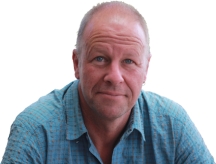 Dave is the author of the book Hope Beyond Cure. In December 2011 Dave was diagnosed with lung cancer. To be specific—stage 4 non-small cell lung cancer. The cancer was considered inoperable and incurable. Dave has responded well to three weekly chemotherapy treatment and is currently considered to be NED (no evidence of disease).
Dave is the author of the book Hope Beyond Cure. In December 2011 Dave was diagnosed with lung cancer. To be specific—stage 4 non-small cell lung cancer. The cancer was considered inoperable and incurable. Dave has responded well to three weekly chemotherapy treatment and is currently considered to be NED (no evidence of disease).
